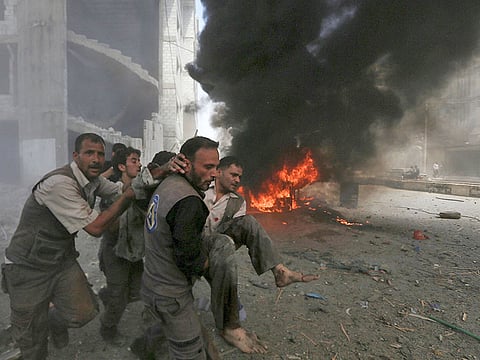Put Syrian conflict on the front burner
Al Assad is a liability and if it takes an offer of sanctuary for him, his closest colleagues and their families to bring him on board, so be it

The Syrian people have been shamefully abandoned to bombs, terrorist attacks, hunger, homelessness, and refugee status. The statistics are appalling — more than 240,000 killed and close to 12 million displaced — yet the once anguished world seems to have moved on.
There is no sense of urgency being displayed by the big powers cheering different sides in what’s evolved into a proxy conflict. It’s in the interests of Russia and Iran to keep the Bashar Al Assad regime in power and the Bush administration’s momentum was lost when US President Barack Obama stepped back from launching strikes on Syrian sites.
And over the past year there’s been little outcry from ordinary folk; perhaps because the sheer scale of misery is too great to contemplate in the same way that most of us can’t envisage what a billion dollars in cash would look like.
It’s simpler for the average person browsing the net or channel surfing to identify with a single child, like Ali Dawabsheh who was burnt to death when Israeli colonists torched his family’s home or the demise of an iconic lion at the hands of an American dentist. Personalising tens of thousands of children is an impossible feat and so those buried under mountains of rubble or hanged for failing to fast during Ramadan are rendered nameless and forgotten.
Moreover foreign activists tend to turn their attention to conflicts in which the good guys are more easily identifiable from the bad. What purpose would a BDS movement targeting the Syrian regime have, for example?
Plus, the conflict itself has become too complex to get to grips with. It’s difficult even for experts to know who’s battling whom at any given time when allegiances are frequently switched. Naturally, the media takes its cues from its readership. Syria rarely makes the front pages nowadays. And to be fair, there’s a paucity of hard facts because this is a country where only the most courageous (or the most foolish) reporters dare to venture.
Feelings of helplessness and hopelessness drive many to avoid dwelling on graphic photos and videos showing Syrian children in advanced stages of malnutrition, prisoners packed into wire cages destined to be lowered under water or families under canvas in searing heat or pulling scant clothing around them when wading through mud and garbage.
In the absence of concrete solutions, those images provoke instant feelings of sorrow followed by unease. We, lucky enough to live in air-conditioned homes with bottles of ice-cold mineral water in our refrigerators, feel uncomfortable imagining what life must be like for the millions of Syrians without adequate shelter, electricity, clean water, milk for their babies and medicines for chronic diseases or those parents and children huddling in the dark each night wondering if this night will be their last. We often resist placing ourselves in the shoes of those who flee to European shores in rickety boats where the survivors are more often than not considered a nuisance burden on taxpayers.
It’s beyond time that the US, the European Union, Russia and Iran quit taking sides and stopped flooding the country with more and more weapons that only serve to prolong the conflict. There is no good side; not the regime partnered with Iran and Hezbollah and certainly not Daesh (the self-proclaimed Islamic State of Iraq and the Levant), Al Qaida and its affiliate the Al Nusra Front. The Free Syrian Army, once backed by the Obama administration, can’t claim to have clean hands and, in any event, even before its numbers dwindled it was seen as ineffective.
Dictating terms
By all accounts now that the Bashar Al Assad regime is losing ground — it only controls around 7 per cent of the country — it’s ready to deal. The Syrian Army is fatigued; its weapons stocks depleted. This is the moment for countries with a stake in this war to dictate terms.
Al Assad must be persuaded by his friends, Russia and Iran, that he’s a liability. And if it takes an offer of sanctuary for himself, his closest colleagues and their families to bring him on board, so be it.
As long as the sword of justice hangs over his head, he’ll tighten his grip and take his people down with him. The number one priority for negotiators should be ceasing the Syrian people’s nightmare.
Once a new and carefully selected new caretaker leadership is in place, one that speaks for all factions apart from the terrorists, the international community can work with the Syrian government to destroy armed radicals and their foreign cohorts.
Then again the grubby world of geopolitics is not fuelled by humanitarian concerns, only interests. If only on this occasion I’m proved wrong!
Linda S. Heard is a specialist writer on Middle East affairs. She can be contacted at lheard@gulfnews.com
Sign up for the Daily Briefing
Get the latest news and updates straight to your inbox



